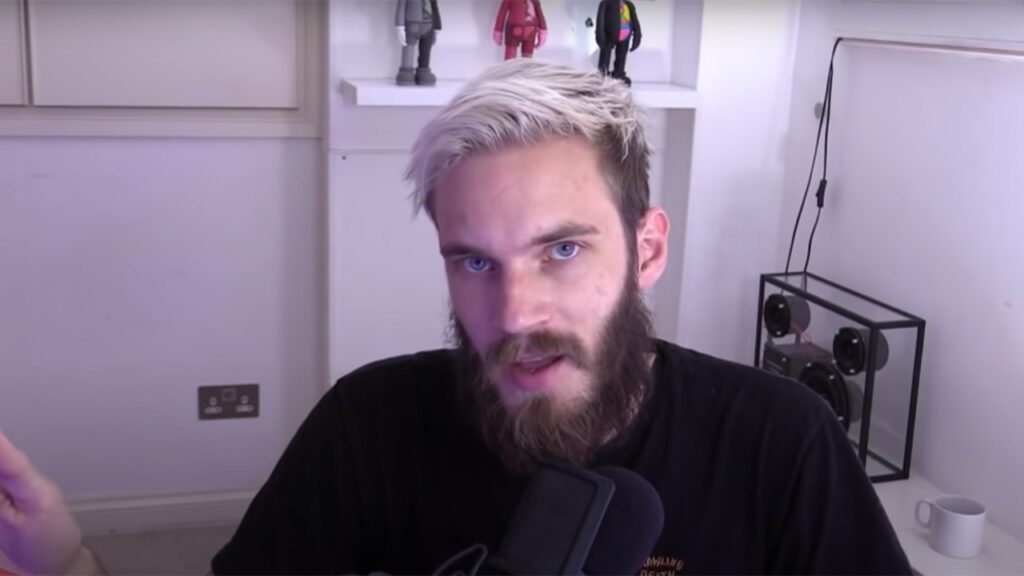In the ever-evolving world of internet culture, few moments have captured the public's attention quite like "The PewDiePie Bridge Incident." This event, involving one of YouTube's most iconic personalities, became a viral sensation and sparked widespread debate. The incident not only highlighted the complexities of modern online interactions but also raised important questions about internet safety, ethics, and the role of influencers in shaping public discourse.
The PewDiePie Bridge Incident, which unfolded in 2017, quickly became a focal point for discussions around digital behavior and the responsibilities of content creators. As a global phenomenon, PewDiePie's influence extends far beyond entertainment, touching on societal issues that resonate with millions of viewers worldwide.
This article delves into the details of the incident, its implications, and the broader context in which it occurred. By examining the event from multiple perspectives, we aim to provide a comprehensive understanding of its significance and the lessons it offers for both creators and audiences alike.
Read also:Sophie Flay Mother The Untold Story Of Influence And Legacy
Table of Contents
2. Overview of the PewDiePie Bridge Incident
3. Contextual Background of the Incident
4. Public Reaction and Media Coverage
5. YouTube's Response to the Incident
6. Ethical Debate Surrounding the Event
Read also:Where Did Dk Metcalf Go To College Unveiling The Journey Of A Football Star
7. The Incident's Impact on PewDiePie's Career
8. Lessons Learned from the PewDiePie Bridge Incident
9. The Future of Content Creation in the Wake of the Incident
Biography of PewDiePie
Felix Arvid Ulf Kjellberg, better known by his stage name PewDiePie, is a Swedish YouTuber, comedian, and content creator who has become one of the most influential figures in the digital entertainment industry. Born on October 24, 1989, in Stockholm, Sweden, Kjellberg rose to fame through his engaging and humorous Let's Play videos, where he played video games while providing comedic commentary.
Key Facts About PewDiePie
| Full Name | Felix Arvid Ulf Kjellberg |
|---|---|
| Birthdate | October 24, 1989 |
| Place of Birth | Stockholm, Sweden |
| Profession | Content Creator, YouTuber, Comedian |
| Channel Name | PewDiePie |
| Subscribers (as of 2023) | Over 115 million |
PewDiePie's success is a testament to his ability to connect with audiences through relatable humor and genuine personality. However, his prominence also makes him a frequent target of scrutiny, as seen in the bridge incident.
Overview of the PewDiePie Bridge Incident
The PewDiePie Bridge Incident refers to an event that took place in 2017 when PewDiePie filmed a video at a bridge in India. During the shoot, he encountered two individuals who appeared to be homeless. The situation escalated when PewDiePie jokingly offered them money to hold a sign that read, "Join PewDiePie for world domination." The video, intended as a comedic segment, quickly drew criticism for its insensitivity and lack of cultural awareness.
This incident sparked outrage among viewers and critics alike, highlighting the thin line between humor and offensive content. While PewDiePie claimed the video was meant as satire, many interpreted it as exploitative and disrespectful.
Contextual Background of the Incident
To fully understand the significance of the PewDiePie Bridge Incident, it is essential to consider the cultural and social context in which it occurred. At the time, PewDiePie was already under scrutiny for several controversial videos, including those featuring offensive jokes and questionable content. The bridge incident, therefore, served as a tipping point, amplifying existing criticisms and sparking a broader conversation about the responsibilities of influencers.
Factors Contributing to the Controversy
- Cultural Sensitivity: The video was filmed in India, a country with deep cultural traditions and significant economic disparities. Critics argued that PewDiePie failed to recognize the gravity of portraying vulnerable individuals in a humorous context.
- Public Expectations: As one of the most subscribed YouTubers, PewDiePie's audience includes millions of impressionable young viewers. This heightened responsibility placed greater scrutiny on his content choices.
- Corporate Pressure: YouTube and its advertisers were increasingly concerned about aligning themselves with controversial creators. The incident further complicated PewDiePie's relationship with the platform.
Public Reaction and Media Coverage
The public reaction to the PewDiePie Bridge Incident was swift and widespread. Social media platforms erupted with discussions, with many users expressing disappointment and outrage. Critics accused PewDiePie of perpetuating stereotypes and exploiting marginalized communities for comedic effect. Meanwhile, his supporters defended him, arguing that the video was misunderstood and taken out of context.
Media outlets extensively covered the incident, amplifying the debate and drawing attention to larger issues surrounding content creation and ethical boundaries. The controversy even spilled over into mainstream news, with several prominent publications weighing in on the matter.
YouTube's Response to the Incident
YouTube's response to the PewDiePie Bridge Incident was a crucial development in the unfolding drama. The platform, which had already faced criticism for its handling of controversial content, took steps to address the situation. PewDiePie's videos were temporarily demonetized, and he was removed from YouTube's Preferred Program, a partnership initiative for top creators.
In a statement, YouTube emphasized its commitment to promoting responsible content creation while acknowledging the complexities of regulating such a vast platform. The incident prompted the platform to reassess its policies and guidelines, ultimately leading to stricter enforcement of community standards.
Ethical Debate Surrounding the Event
The PewDiePie Bridge Incident ignited a robust ethical debate about the role of influencers in shaping public opinion and cultural norms. Critics argued that PewDiePie's actions demonstrated a lack of empathy and responsibility, while defenders maintained that creative freedom should be preserved, even if it occasionally leads to controversy.
Key Ethical Questions Raised by the Incident
- Exploitation vs. Satire: Is it possible to create satirical content without crossing into exploitation? Where should the line be drawn?
- Platform Responsibility: To what extent should platforms like YouTube regulate the content of creators while respecting their artistic freedom?
- Public Influence: How should influencers balance entertainment with ethical considerations, especially when their audience includes impressionable individuals?
The Incident's Impact on PewDiePie's Career
While the PewDiePie Bridge Incident dealt a significant blow to his reputation, it ultimately did not derail his career. PewDiePie addressed the controversy in subsequent videos, acknowledging the concerns raised and pledging to be more mindful of cultural sensitivities in the future. His transparency and willingness to engage with critics helped him regain some trust among his audience.
Despite the backlash, PewDiePie remains one of the most successful YouTubers globally, with a subscriber count that continues to grow. The incident, however, served as a wake-up call, prompting him to reassess his approach to content creation and engage more meaningfully with his audience.
Lessons Learned from the PewDiePie Bridge Incident
The PewDiePie Bridge Incident offers valuable lessons for both creators and audiences. For creators, it underscores the importance of cultural sensitivity, ethical responsibility, and the need to consider the broader implications of their content. For audiences, it highlights the power of public discourse in holding influencers accountable and shaping the future of digital media.
Key Takeaways from the Incident
- Empathy Matters: Content creators must prioritize empathy and cultural awareness when crafting their material.
- Transparency Builds Trust: Addressing criticism openly and honestly can help rebuild trust with audiences.
- Community Standards Evolve: Platforms and creators must adapt to changing societal norms and expectations.
The Future of Content Creation in the Wake of the Incident
The PewDiePie Bridge Incident reflects the evolving landscape of content creation in the digital age. As platforms grow and audiences become more diverse, creators must navigate complex ethical and cultural considerations. The incident serves as a reminder that with great influence comes great responsibility, and the choices made by creators can have far-reaching consequences.
Looking ahead, the future of content creation will likely see increased emphasis on ethical guidelines, cultural sensitivity, and community engagement. Platforms like YouTube will continue to refine their policies to strike a balance between creative freedom and responsible content.
Conclusion
The PewDiePie Bridge Incident remains a defining moment in the history of digital media, sparking important discussions about ethics, responsibility, and the role of influencers in shaping public discourse. While the event generated significant controversy, it also provided valuable lessons for creators and audiences alike.
As the digital landscape continues to evolve, it is crucial for all stakeholders to prioritize empathy, cultural awareness, and ethical considerations in their content creation efforts. We invite you to share your thoughts on this topic in the comments below and explore other articles on our site for more insights into the world of digital media.

